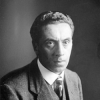Ernst Toller

Ernst Toller
Ernst Tollerwas a German left-wing playwright, best known for his Expressionist plays. He served in 1919 for six days as President of the short-lived Bavarian Soviet Republic, and was imprisoned for five years for his actions. He wrote several plays and poetry during that period, which gained him international renown. They were performed in London and New York as well as Berlin. In 2000, several of his plays were published in an English translation...
NationalityGerman
ProfessionPlaywright
Date of Birth1 December 1893
CountryGermany